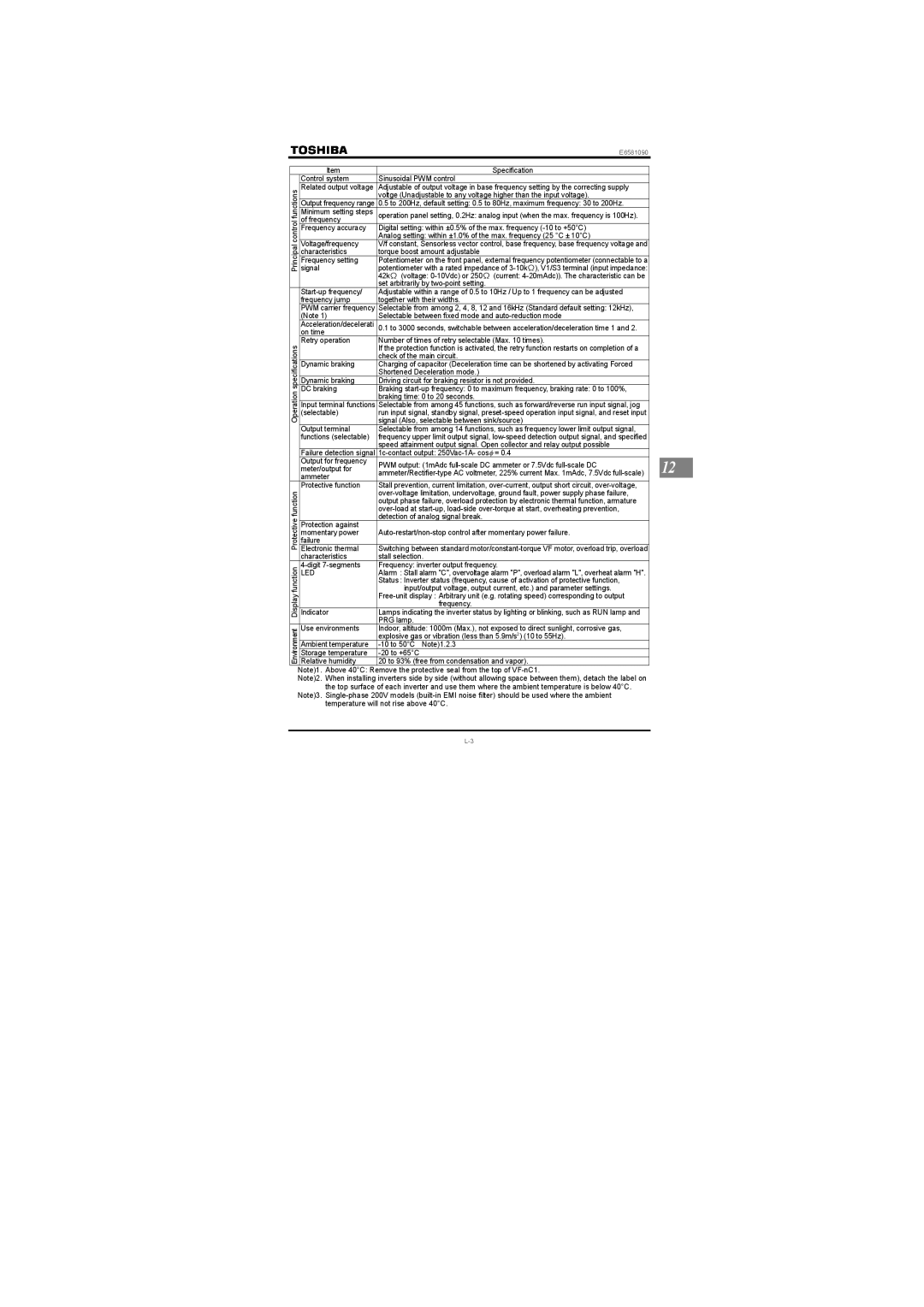
|
| E6581090 |
|
| |
|
|
|
|
|
|
| Item | Specification |
|
| |
| Control system | Sinusoidal PWM control |
|
|
|
functions | Related output voltage | Adjustable of output voltage in base frequency setting by the correcting supply |
|
|
|
Minimum setting steps | operation panel setting, 0.2Hz: analog input (when the max. frequency is 100Hz). |
|
|
| |
|
| voltge (Unadjustable to any voltage higher than the input voltage). |
|
|
|
| Output frequency range | 0.5 to 200Hz, default setting: 0.5 to 80Hz, maximum frequency: 30 to 200Hz. |
|
|
|
control | of frequency |
|
|
|
|
| Frequency accuracy | Digital setting: within ±0.5% of the max. frequency |
|
|
|
|
| Analog setting: within ±1.0% of the max. frequency (25 °C ± 10°C) |
|
|
|
Principal | Voltage/frequency | V/f constant, Sensorless vector control, base frequency, base frequency voltage and |
|
|
|
signal | potentiometer with a rated impedance of |
|
|
| |
| characteristics | torque boost amount adjustable |
|
|
|
| Frequency setting | Potentiometer on the front panel, external frequency potentiometer (connectable to a |
|
|
|
|
| 42kΩ (voltage: |
|
|
|
|
| set arbitrarily by |
|
|
|
| Adjustable within a range of 0.5 to 10Hz / Up to 1 frequency can be adjusted |
|
|
| |
| frequency jump | together with their widths. |
|
|
|
| PWM carrier frequency | Selectable from among 2, 4, 8, 12 and 16kHz (Standard default setting: 12kHz), |
|
|
|
| (Note 1) | Selectable between fixed mode and |
|
|
|
| Acceleration/decelerati | 0.1 to 3000 seconds, switchable between acceleration/deceleration time 1 and 2. |
|
|
|
| on time |
|
|
|
|
| Retry operation | Number of times of retry selectable (Max. 10 times). |
|
|
|
specifications |
| If the protection function is activated, the retry function restarts on completion of a |
|
|
|
| check of the main circuit. |
|
|
| |
| Dynamic braking | Charging of capacitor (Deceleration time can be shortened by activating Forced |
|
|
|
|
| Shortened Deceleration mode.) |
|
|
|
| Dynamic braking | Driving circuit for braking resistor is not provided. |
|
|
|
Operation | DC braking | Braking |
|
|
|
| signal (Also, selectable between sink/source) |
|
|
| |
|
| braking time: 0 to 20 seconds. |
|
|
|
| Input terminal functions | Selectable from among 45 functions, such as forward/reverse run input signal, jog |
|
|
|
| (selectable) | run input signal, standby signal, |
|
|
|
|
|
|
|
|
|
| Output terminal | Selectable from among 14 functions, such as frequency lower limit output signal, |
|
| |
| functions (selectable) | frequency upper limit output signal, |
|
|
|
|
| speed attainment output signal. Open collector and relay output possible |
|
|
|
| Failure detection signal |
|
|
| |
| Output for frequency | PWM output: (1mAdc |
|
| 12 |
| meter/output for |
|
| ||
|
|
| |||
| ammeter |
|
|
|
|
| Protective function | Stall prevention, current limitation, |
|
|
|
function |
|
|
|
| |
| output phase failure, overload protection by electronic thermal function, armature |
|
|
| |
|
|
|
|
| |
Protective |
| detection of analog signal break. |
|
|
|
| Protection against |
|
|
| |
| momentary power |
|
|
| |
| failure |
|
|
|
|
| Electronic thermal | Switching between standard |
|
|
|
| characteristics | stall selection. |
|
|
|
function | Frequency: inverter output frequency. |
|
|
| |
LED | Alarm : Stall alarm "C", overvoltage alarm "P", overload alarm "L", overheat alarm "H". |
|
|
| |
| Status : Inverter status (frequency, cause of activation of protective function, |
|
|
| |
| input/output voltage, output current, etc.) and parameter settings. |
|
|
| |
Display | Indicator |
|
|
| |
Lamps indicating the inverter status by lighting or blinking, such as RUN lamp and |
|
|
| ||
|
| frequency. |
|
|
|
|
| PRG lamp. |
|
|
|
Environment | Use environments | Indoor, altitude: 1000m (Max.), not exposed to direct sunlight, corrosive gas, |
|
|
|
Relative humidity | 20 to 93% (free from condensation and vapor). |
|
|
| |
|
| explosive gas or vibration (less than 5.9m/s2) (10 to 55Hz). |
|
|
|
| Ambient temperature |
|
|
| |
| Storage temperature |
|
|
| |
|
|
|
|
|
|
Note)1. Above 40°C: Remove the protective seal from the top of
Note)2. When installing inverters side by side (without allowing space between them), detach the label on the top surface of each inverter and use them where the ambient temperature is below 40°C.
Note)3.
